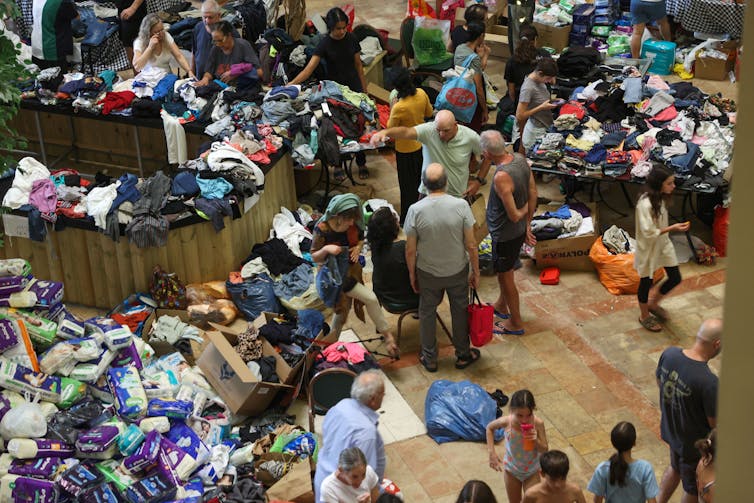
The U.S. government has stepped up its focus on Israel following the Oct. 7, 2023, Hamas attacks. American Jews are also responding, in part by sending money and other kinds of aid.
The Conversation asked Hanna Shaul Bar Nissim, a scholar of Jewish philanthropy, to describe recent trends in U.S. giving to Israeli causes and how it’s changing.
Is US Jewish giving to Israeli causes significant?
Yes. Nonprofits in Israel say they get an estimated US$2 billion a year in donations from other countries. Over half of that is from Jewish organizations and individuals in North America, mostly the United States. Jewish federations, regional organizations that give collectively to causes in the U.S. and in foreign countries, private family foundations and donor-advised funds provide the lion’s share of this money.
Historically, U.S. Jewish giving to Israeli causes and other forms of financial support for Israel, such as purchases of Israeli bonds, have been motivated by religious, national and cultural traditions.
U.S. Jewish giving to Israeli causes has been significant since the country’s founding 75 years ago in 1948. These donations have supported secular and faith-based programming and organizations, sustained community institutions, funded the work of advocacy organizations and met social and educational needs.
This kind of philanthropy is a traditional expression of emotional attachment to Israel that is shared by Jews of many different backgrounds and denominations. About 2 in 3 American Jews personally feel connected to Israel, according to recent research.
Multiple factors influence the amount of money U.S. Jews give to Israeli causes, including changes to American tax laws regarding donations to overseas organizations. In recent years, Israel’s increasingly conservative social and religious policies – which clash with the liberal politics of most American Jews – have contributed to a decline in giving.
Do wars and other major conflicts usually affect Jewish giving to Israel?
Traditionally, more American Jews have donated to Israeli causes during emergencies, military operations and environmental disasters, and they’ve given more money amid crises.
But those spikes in giving have gotten smaller over the past two decades, and American Jewish giving to Israel has declined in general.

What’s new this time?
A surge of donations began immediately after Oct. 7. It included funds for nonprofits and Israeli bond purchases by individual investors in the U.S. and around the world, as well as by state and local U.S. governments.
Fundraising efforts in the U.S. following Oct. 7 raised more than $100 million within seven days after the attacks.
Many U.S. volunteers are lending their time and expertise to cover operational and logistical needs.
And some Israelis who live in the United States have helped arrange prefunded charter flights for their compatriots who wish to go back there to distribute aid.

What was going on before Oct. 7?
U.S. Jewish philanthropy for Israel had been changing before the current conflict began. The government’s controversial attempt to change Israel’s judicial system, led by Prime Minister Benjamin Netanyahu, was increasing global interest in events taking place in Israel and dividing Israeli society.
Some American Jewish donors were voicing their objections and funding Israeli nonprofits that oppose the changes.
A group of wealthy U.S. Jewish donors and family foundations, for example, sent an open letter to Netanyahu in February 2023 that warned of the negative potential consequences for Israeli democracy and the harm that would do to relations with Jews outside Israel. The signatories included Charles Bronfman, a co-founder of Birthright, which takes young Jewish people on free, 10-day trips to Israel.
Are there other sources of US philanthropy for Israel outside the Jewish community?
Multiple U.S. corporations have pledged to donate humanitarian aid or match employee donations, including Fox Corp. and Goldman Sachs.
This is a rare source of philanthropic support for Israel.
Hanna Shaul Bar Nissim is the Deputy Director U.S., of the Ruderman Family Foundation.
This article was originally published on The Conversation. Read the original article.







